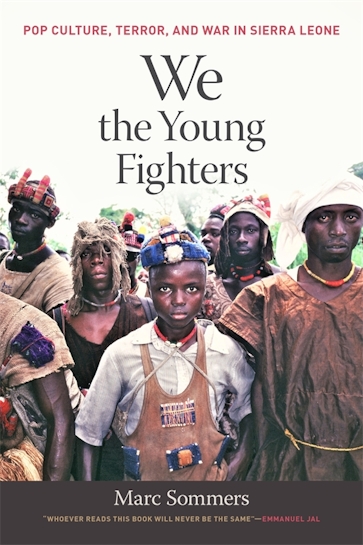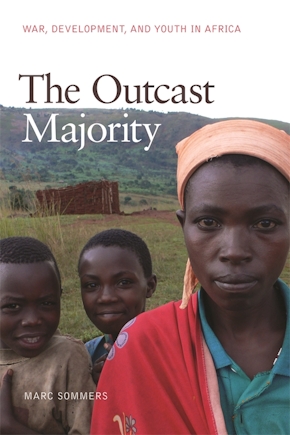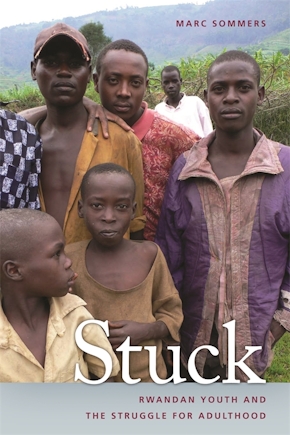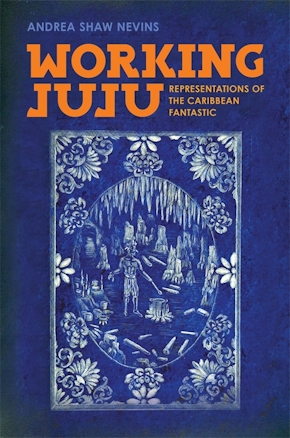We the Young Fighters
Pop Culture, Terror, and War in Sierra Leone
Title Details
Pages: 488
Illustrations: 19 b&w images
Trim size: 6.120in x 9.250in
Formats
Paperback
Pub Date: 10/01/2023
ISBN: 9-780-8203-6474-2
List Price: $32.95
Hardcover
Pub Date: 10/01/2023
ISBN: 9-780-8203-6473-5
List Price: $114.95
eBook
Pub Date: 10/01/2023
ISBN: 9-780-8203-6475-9
List Price: $32.95
eBook
Pub Date: 10/01/2023
ISBN: 9-780-8203-6476-6
List Price: $32.95
Related Subjects
SOCIAL SCIENCE / Popular Culture
SOCIAL SCIENCE / Children's Studies
We the Young Fighters
Pop Culture, Terror, and War in Sierra Leone
How Tupac, Rambo, and Bob Marley wove their way into the conflict fabric of Sierra Leone
Skip to
- Description
- Reviews
We the Young Fighters is at once a history of a nation, the story of a war, and the saga of downtrodden young people and three pop culture superstars. Reggae idol Bob Marley, rap legend Tupac Shakur, and the John Rambo movie character all portrayed an upside-down world, where those in the right are blamed while the powerful attack them. Their collective example found fertile ground in the West African nation of Sierra Leone, where youth were entrapped, inequality was blatant, and dissent was impossible.
When warfare spotlighting diamonds, marijuana, and extreme terror began in 1991, military leaders exploited the trio’s transcendent power over their young fighters and captives. Once the war expired, youth again turned to Marley for inspiration and Tupac for friendship.
Thoroughly researched and accessibly written, We the Young Fighters probes terror-based warfare and how Tupac, Rambo, and—especially—Bob Marley wove their way into the fabric of alienation, resistance, and hope in Sierra Leone. The tale of pop culture heroes radicalizing warfare and shaping peacetime underscores the need to engage with alienated youth and reform predatory governments. The book ends with a framework for customizing the international response to these twin challenges.
—Emmanuel Jal, recording artist, actor, peace activist, and author of War Child: A Child Soldier's Story
—Ismail Rashid, history professor, Vassar College
—Michela Wrong, author of Do Not Disturb: The Story of a Political Murder and an African Regime Gone Bad
—Fionnuala Ní Aoláin, Regents Professor University of Minnesota Law School, UN Special Rapporteur Counter-Terrorism and Human Rights
A great book. Sommers has written an enthralling cultural history of civil war in Sierra Leone, focusing on the young fighters and how they draw upon transatlantic popular culture to make sense of the world and their exclusion from its circuits of power. He allows us to make sense of the carnival of violence unleashed as a resistance script of modernity and challenges politicians and development practitioners to take young people seriously.
—Alex de Waal, executive director, World Peace Foundation; research professor, the Fletcher School at Tufts University, and author of The Real Politics of the Horn of Africa: Money, War, and the Business of Power
—Elizabeth (Liz) Hume, executive director, Alliance for Peacebuilding
—Alex Vines OBE, director, Africa Programme, Chatham House, and assistant professor, Faculty of Arts and Humanities, Coventry University
—Michael Wessells, professor, Program on Forced Migration and Health, Columbia University, author of Child Soldiers: From Violence to Protection
—David Keen, professor of conflict studies, London School of Economics and Political Science, author of Conflict and Collusion in Sierra Leone
—Michelle Gavin, Ralph Bunche Senior Fellow for Africa Policy Studies, Council on Foreign Relations, and former U.S. ambassador to Botswana
—'Funmi Olonisakin, vice president (international, engagement, and service) and professor of security, leadership, and development, King’s College London, author of Peacekeeping in Sierra Leone: The Story of UNAMSIL
—Robin Holzhauer, The Foreign Service Journal



